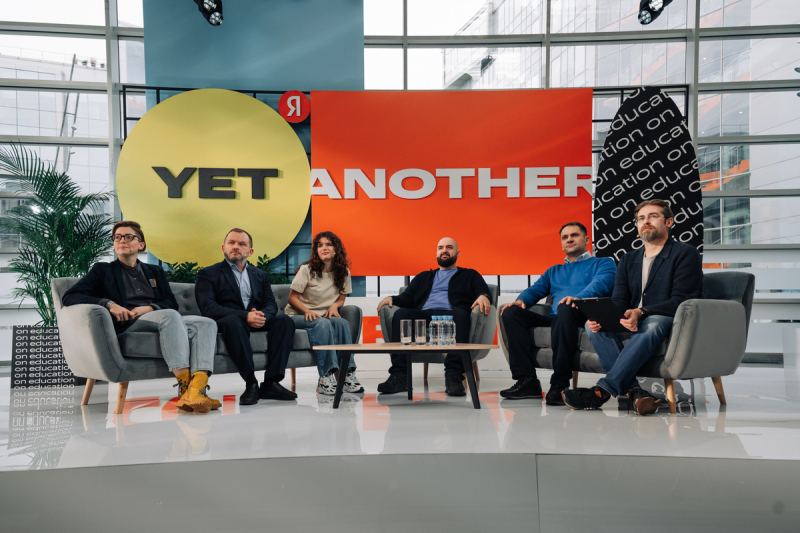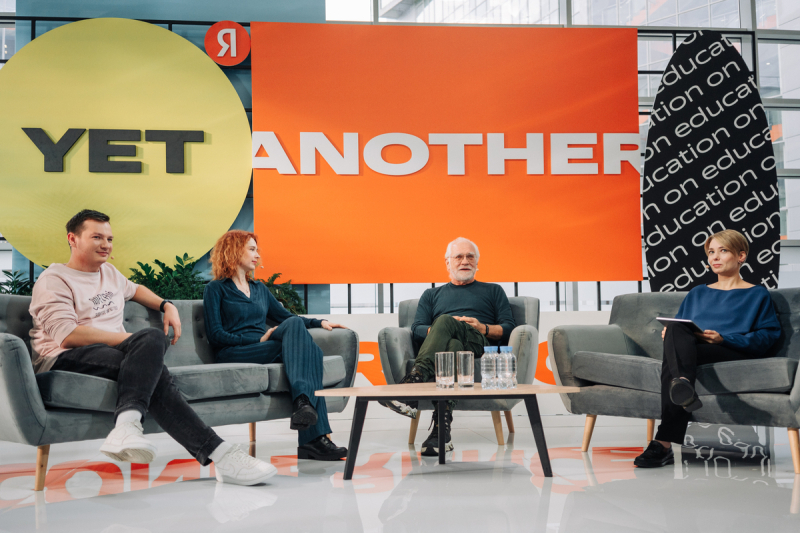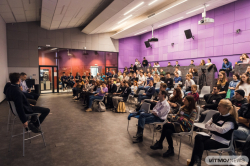Making your break: universities versus online learning
What is the best place to get an IT education? That’s an age-long question that experts have many opinions on. Some believe a university education is a source of not just practical skills, but also fundamental knowledge from adjacent fields. Others say that technical skills are the only thing you need to excel in IT. But all agree that the choice depends on the student’s end goals.
“Some come to university to acquire knowledge of, say, math or humanities. They want to become a smart, capable person; to gain a foundation upon which to build later. This is something everyone needs. You can’t become a developer without having an understanding of operational systems, algorithms, databases, and much more,” said Ilya Obabkov, head of the Institute of Radio Electronics and Information Technologies at Ural Federal University.
Elizaveta Kiseleva, Ivan Arzhantsev, Ekaterina Serazhim, Aleksei Shpilman, Ilya Obabkov, and Alexander Kraynov at the discussion. Credit: Yandex
A different opinion was shared by Elizaveta Kiseleva, the Chief Education Officer at the online school Karpov.Courses.
“If a student wants to start a career as, for example, a data analyst, they can sign up for online courses after finishing school, prove their mettle there, and then get an internship at a company while continuing to study. Many developers and machine learning specialists don’t have a basic technical education but are nevertheless successful in their profession,” she offered.
Elizaveta Kiseleva. Credit: Yandex
University – more than knowledge
But a university is not just a place where you acquire knowledge and skills. Here, students find themselves in a comfortable environment and are free to decide which subjects to study, which projects to develop, and which teams to join. It is where they can learn and, possibly, change their future plans and adjust their curriculum accordingly. This is something that online learning can’t offer.
“University is more than a diploma or even knowledge. It’s about networking and the opportunity to find yourself and your calling,” said Kirill Aleksandrov, the head of ITMO’s Strategic Communications Department.
Kirill Aleksandrov. Credit: Yandex
At ITMO, students conduct their own lab research and publish articles in top-ranked journals; they discover communities, launch startups, and even try their hand at teaching and mentoring. And in their off time – play sports, compete in events, and make friends.
“The culture of freedom is what makes ITMO the way it is. There are great networking opportunities – a lot of project work, a lot of mingling between students of different subjects, more exchange of opinions. Our graduates, when they go on to work at major companies with a similar atmosphere, like Yandex, are going to feel comfortable there. Thus, the university simply must develop in the same manner as these young companies,” added Kirill Aleksandrov.
Kirill Aleksandrov, Ekaterina Boglaeva, Andrey Sebrant, and Natalya Lukovnikova at the conference. Credit: Yandex
Read also:
More Than a University: ITMO is a Research and Educational Corporation
ITMO Ranked Among Top 3 in Graduate Salaries in IT Industry
Outcomes of 6th St. Petersburg International Labor Forum
Choosing the right path
There are a great many educational programs at universities and online. You can’t always tell from the title what they’re about, which skills they instill in students, and which career prospects they offer. But there are several factors that are helpful in figuring out whether a chosen institution is worth applying to. One such indicator is whether the university or platform is capable of working with industry members to adjust its programs according to market demands and trends.
“We rely on universities with which we’ve already got a relationship and which are ready to respond to our requests. If we need to add a new subject or specialization, the university should be able to do that. It must be flexible and possess the necessary resources to invite the relevant specialists,” noted Aleksei Shpilman, the head of AI development programs at Gazprom Neft.
Aleksei Shpilman. Credit: Yandex
According to Ilya Obabkov, there are several other criteria worth considering: the university’s entry threshold; whether it has industrial partners who support its educational programs; and, finally, its ability to provide students with an opportunity to try on different roles and decide on their future careers.
If you’ve decided to acquire a profession through online learning, but can’t find the right place, Elizaveta Kiseleva suggests paying attention to the employment rate: check how many of the platform’s graduates have found jobs after graduation and work in their chosen field.
Aleksei Shpilman, Ilya Obabkov, and Alexander Kraynov. Credit: Yandex
Are universities falling behind the industry?
Some students aren’t all that eager to apply to university, believing the conventional education is lagging behind the rapidly changing trends of the IT industry. Over the course of a four-year degree, the acquired knowledge and skills may become obsolete, causing graduates to have to start all over again. But according to Ivan Arzhantsev, the dean of the Faculty of Computer Science at the Higher School of Economics, the gap between academia and the industry can be made narrower through collaboration with practicing specialists:
“If a lecturer is teaching industrial programming, they must know how the industry works. The situation we had ten years ago, when teachers knew nothing of the industry, is no longer the reality. Nowadays, industrial programming is taught by people from top companies like Yandex, Sberbank, or 1C,” explained Ivan Arzhantsev.
Ivan Arzhantsev. Credit: Yandex
Ilya Obabkov agreed – and suggested even more ways for universities to keep up with the times. One option is to use pre-recorded online lectures by experts from IT companies. This is especially relevant for students in non-central regions, where lectures by guest experts of this kind are more seldom.
As part of Yet another Conference on Education, many other discussions on the topic of the IT industry were held. How are all professions these days connected to IT? How do you stop fearing complex subjects like math or computer science? Why is the division into tech and humanities outdated? And how are information technologies used in Art & Science? To find the discussion you’re interested in and watch it online, visit the conference’s official website (in Russian).





